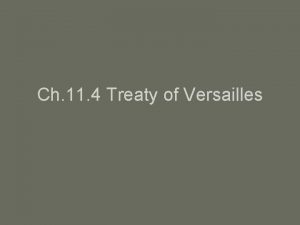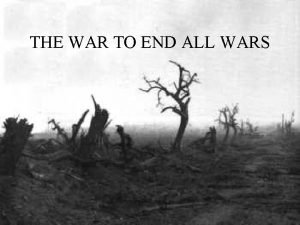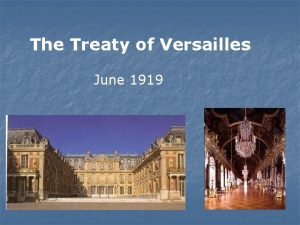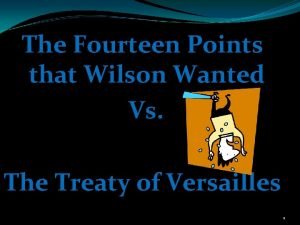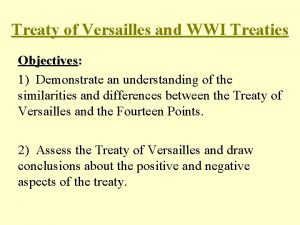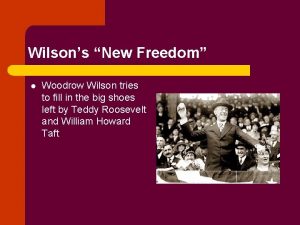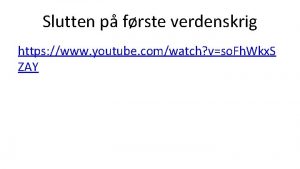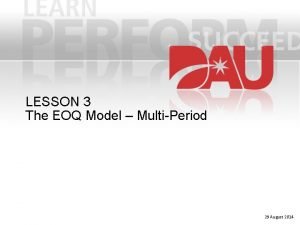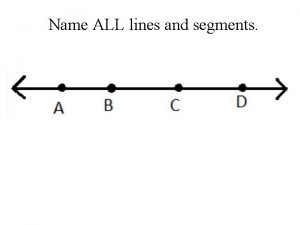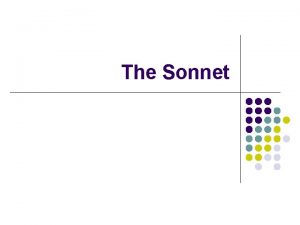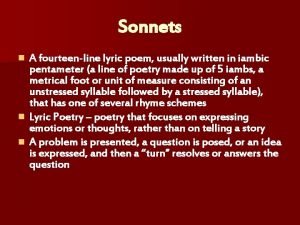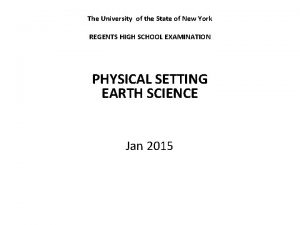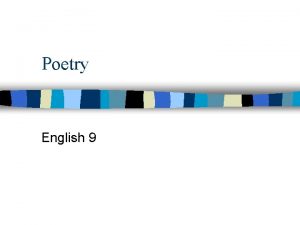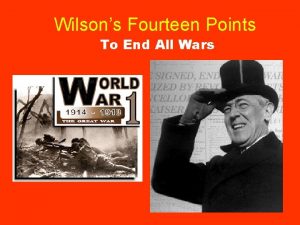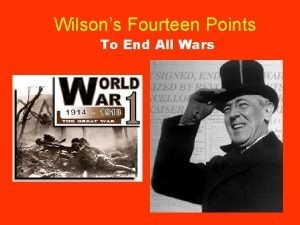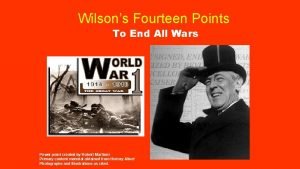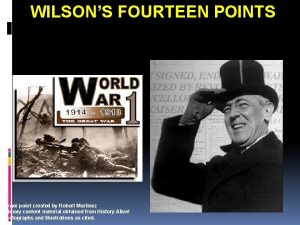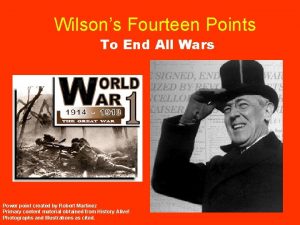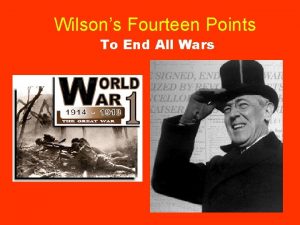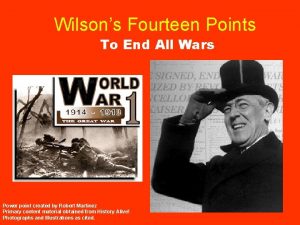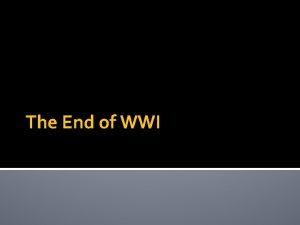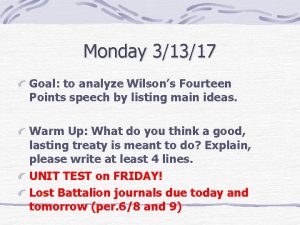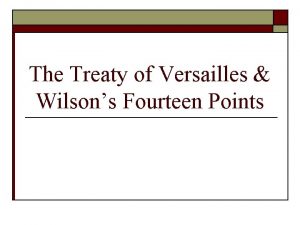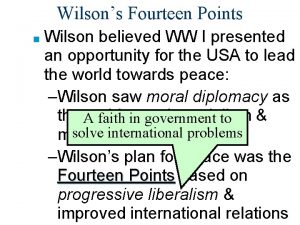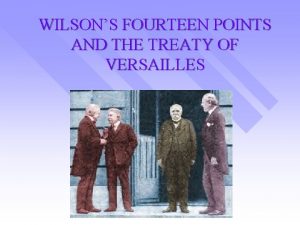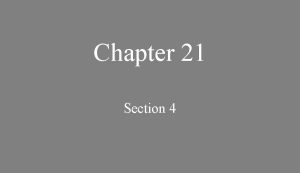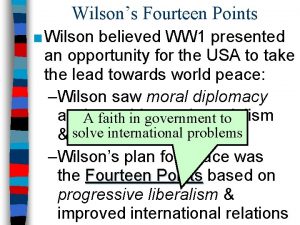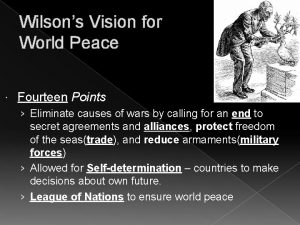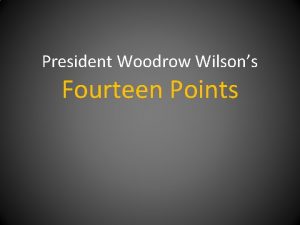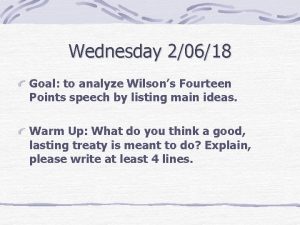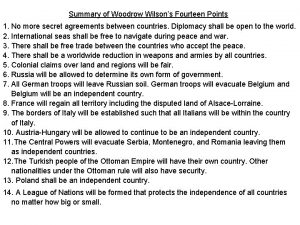Wilsons Fourteen Points To End All Wars On























- Slides: 23

Wilson’s Fourteen Points To End All Wars

• On January 8, 1918, President Woodrow Wilson went before Congress to explain his war aims. • Although the war was still raging, he stated an ambitious program to make the world “fit and safe to live in. ” • He called his blueprint for peace the Fourteen Points. http: //207. 150. 180. 135/images/en/thumb/f/fd/300 px-Wilson_announcing_the_break_in_the_official_relations_with_Germany. jpg

End Causes of War • The 1 st goal of Wilson’s peace plan was to eliminate the causes of wars. Wilson went to France to help create a treaty. http: //www. stmarystoday. com/features/0609 wwilson. jpg

League of Nations • The last goal called for setting up an international organization called the League of Nations to ensure world peace. • Member nations would agree to protect one another’s independence and territorial integrity. http: //www. greatwardifferent. com/Great_War/1919/Panorama%20 dl. G%20 -%20 Versailles%20003. jpg

Territorial Integrity • Under the principle of territorial integrity, nations respect one another’s borders and do not try to gain another country’s territory by force. http: //www. royal. gov. uk/files/images/Insight_Nov 2003_Focus_GVWW_large. jpg

Fourteen Points 1 • Point One- Countries would not make secret treaties and alliances. • Secret alliances had been a cause of WW I. http: //chakotay. candw. ky/users/cay 11394/world%20 handshake. jpg

Fourteen Points 2 • Ships would be able to travel freely in times of war. • U-boat attacks on shipping had drawn the United States into WWI. http: //collectinghistory. net/WWI%20 U-boat. jpg

Fourteen Points 3 • Free trade among countries would promote economic growth and reduce trade conflicts that could draw nations into war. http: //www. amsouth. com/graphics/Free. Trade. jpg

Fourteen Points 4 • Countries would reduce their stockpiles of weapons. • Militarism had been a cause of WW I. http: //www. flickr. com/photos/orange 27/1282521427/ http: //img. search. com/c/cd/300 px-British_Mark_IV_Tadpole_tank. jpg

Fourteen Points 5 • The desires of colonial peoples would be taken into consideration in creating a more peaceful world. • Imperialism and competition for colonies had been a cause of WW I. http: //www. miracosta. edu/home/llane/courses/hist 111/pw/images/imperialism. gif

Fourteen Points 6 -13 • Restoring land taken from countries by war would restore respect for international law. • Redrawing borders on the basis of selfdetermination would reduce conflicts among ethnic groups. http: //www. aguilarfence. com/Broken_Fence. jpg

Fourteen Points 14 • Countries would work together in the League of Nations to resolve conflicts before those conflicts escalated into war. http: //history. sandiego. edu/gen/WW 2 Pics/81486 sm. gif

The Treaty of Versailles • The Treaty of Versailles negotiated in Paris redrew the map of Europe, granting selfdetermination to some groups. • Some Allies sought revenge on Germany, insisting on a war-guilt clause and reparations from Germany. http: //www. gutenberg. org/files/11201 -h/images/175. png

The Big Four • When the heads of the 4 major Allies. France, Great Britain, Italy, and the United States (The Big Four) – met in Paris for peace talks, they were more focused on self-interest than on Wilson’s plan. http: //www. socialistworker. co. uk/chimage. php? image=2007/2037/versailles. jpg

Europe at the beginning of WWI Europe after the Treaty of Versailles

Wilson’s Plan Crumbles Terms of the Treaty: • Created nine new countries • Shut down Germany’s military • France gets land from Germany • Germany must pay $33 billion in reparations • Germany must admit guilt for the war

Reparations • Reparations are payments demanded of a defeated nation by the victor in a war to offset the cost of the war. • Germans resented both the war-guilt clause and reparations, fearing that the payments would cripple their economic recovery.

Wilson Compromises The other countries had lost many lives and property, and they expected compensation. The Allies had borrowed huge sums form American banks to finance the war. They hoped to repay these debts with reparations from Germany. Effect? ? ? Wilson reluctantly agreed to the harsh treatment of Germany. http: //www. firstworldwar. com/source/graphics/wilson 3. jpg

League of Nations Charter • Wilson hoped that including the League of Nations in the final treaty would make up for his compromises on other issues. • He believed that the League would maintain world peace. http: //www. gutenberg. org/files/15937 -h/images/image 135 h. jpg

Ratifying the Versailles Treaty • Wilson required a 2/3 majority vote from the U. S. Senate to ratify the treaty. http: //www. amerika. nl/politiek/images/serie/wilsonziek. jpg

Opposition • Rejected by the Senate – TWICE! • Why? ? ? – Isolationists were afraid the League of Nations would pull the U. S. into future European conflicts http: //history. sandiego. edu/gen/WW 1 Pics/81579. jpg

Weaknesses of Treaty • Humiliated Germany – led to resentment • Set payment too high for Germany to pay • Left Germany politically and economically unstable • Germany needed a savior…

The Big Question ? Could World War II have been avoided if the U. S. had joined the League of Nations ? http: //uncyclopedia. org/images/thumb/e/ed/Woodrow-wilson. jpg/180 px-Woodrow-wilson. jpg
 Wilson's fourteen points and the treaty of versailles
Wilson's fourteen points and the treaty of versailles The war to end all wars
The war to end all wars The war to end all wars worksheet
The war to end all wars worksheet Kelembagaan dunia
Kelembagaan dunia Siya ang may akda ng fourteen points
Siya ang may akda ng fourteen points Siya ang may akda ng fourteen points
Siya ang may akda ng fourteen points Teoryang realismo
Teoryang realismo Fourteen points and treaty of versailles similarities
Fourteen points and treaty of versailles similarities Why did president wilson propose his fourteen points
Why did president wilson propose his fourteen points End of persian war
End of persian war Gange med brøk
Gange med brøk Wilsons new freedom
Wilsons new freedom Wilsons 14 punkter
Wilsons 14 punkter Wilsons formel
Wilsons formel Name all the rays
Name all the rays Straddle positioning
Straddle positioning Point of difference and point of parity
Point of difference and point of parity Sonnet examples
Sonnet examples It is a 14-line lyric poem with iambic pentameter.
It is a 14-line lyric poem with iambic pentameter. One two three four five six numbers
One two three four five six numbers Couplet quatrain sestet octave
Couplet quatrain sestet octave The diagram below represents the placoderm fish
The diagram below represents the placoderm fish What is poetry in literature
What is poetry in literature Poem self pity
Poem self pity
